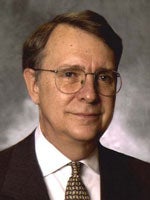
Stephen F. Gates ’72 (M.B.A. ’72) spent more than 30 years as in house counsel with multinational energy and chemical companies, most recently as senior vice president and general counsel at ConocoPhillips. It’s a career path that offers enormous potential for growth, he told a Harvard Law School audience, but the growth has to happen fast, because the job requires that a lawyer become “an instant expert” on the issue (and the crisis) of the moment.
In a talk titled “Line of Fire: On Being a ‘Fortune 10’ General Counsel,” sponsored by the HLS Program on the Legal Profession, on whose advisory board he serves, Gates addressed the role and responsibilities of in-house counsel in today’s changing world of legal practice. But he also spoke candidly about some of the specific situations he has faced in the “line of fire.”
View the video of Gates’ talk.
One of those situations began in 1978, when the Amoco Cadiz, ran aground off the coast of Brittany, France, spilling ten times as much oil as the Exxon Valdez spilled in the waters of Alaska. Fourteen years later, when Gates became general counsel of Amoco, the case was still in the U.S. courts, on cross appeal, headed towards the Supreme Court.
“When I got the case I decided it was time to settle it,” he said. And within a couple of months he did, negotiating with the government of France, as well as resolving outstanding issues involving the company’s insurance coverage, and convincing a third party to make a financial contribution to the settlement.
“It proved to me that there are other ways to resolve disputes than spend decades
in court,” he said, and he has since become a strong advocate of Alternative Dispute Resolution. (He plays a leadership role in the International Institute for Conflict Prevention and Resolution and he has written about his approach to litigation management in an article for Pepperdine Dispute Resolution Law Journal.)
Gates went on to serve in executive and general counsel roles for other companies—from, BP Amoco, to FMC Corporation to ConocoPhillips. Now senior counsel to the firm Mayer Brown, he described for the Harvard audience complex international negotiations on a range of issues—many of which saved his companies from protracted litigation. But he also talked about one case he knew he had to litigate.
“You get sued at a big company five or six times a day,” said Gates. “As general counsel you have your staff deal with most of those suits. But when someone tells you that a suit has been filed in D.C. in federal court alleging that your CEO personally bribed the prime minister of East Timor [to gain an oil concession], you pay attention.” Gates got that call when he was general counsel of ConocoPhillips. He told the Harvard students about the steps he took, including launching an exhaustive internal investigation and hiring outside counsel. No indications of bribery were found, but the case went forward. (It was dismissed in 2008.) “My CEO had to live almost three years with an indeterminate allegation hanging over him that he had done this, when we all knew he had done nothing of the sort,” said Gates. “It’s another defect of the litigation process,” he said, adding that in this case, it was part of doing everything possible to make sure the CEO’s reputation was not impugned. “This is obviously one case that never would be settled under any basis.”